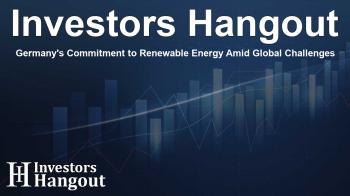Germany's Commitment to Renewable Energy Amid Global Challenges

Germany's Green Energy Commitment
Germany is making significant strides in its commitment to green energy, a path that remains pivotal despite global challenges, including political shifts in the U.S. Recent statements from Vice Chancellor Robert Habeck underscore the importance of maintaining growth plans for renewable energy, especially in light of former President Trump's controversial withdrawal from the Paris climate accord. Habeck's vision is to ensure that 80% of Germany's electricity comes from renewable sources by the year 2030.
Innovative Technologies to Lead the Way
Habeck believes that the focus should be on nurturing and advancing domestic technologies to meet this ambitious goal. His remarks at the Handelsblatt annual energy conference in Berlin highlighted the necessity of taking charge in the renewable sector to counteract the setbacks from international decisions that threaten climate progress. The emphasis on local innovation serves multiple purposes, including economic stability and energy independence.
Addressing the Climate Change Challenge
The withdrawal from the Paris climate treaty by the U.S. was a major setback, as it further complicates the global fight against climate change. This move has been deemed 'fatal' by many climate advocates, as it jeopardizes efforts to keep global temperature increases within safe limits. Germany, as Europe’s leading economy, recognizes the urgency of this issue, and it aims to lead by example through its aggressive renewable energy targets.
Facing Economic Hurdles
As Germany prepares for national elections, the focus is being pulled in multiple directions. The rising cost of living and economic uncertainties due to external factors, such as energy imports and geopolitical tensions, are demanding attention. Despite these challenges, the message from Habeck is clear: perseverance on the green energy strategy is crucial for both economic and environmental recovery. The support from voters for renewable initiatives is paramount in this context.
Energy Independence for the Future
Germany is also reducing its reliance on energy imports, especially as supplies from Russia have become increasingly unreliable since the onset of the conflict in Ukraine. This self-reliance through domestic green energy initiatives is viewed as essential for sustainability and security. Germany is determined to establish a robust renewable energy infrastructure that reduces dependence on external gas supplies, enhancing both energy security and economic resilience.
Legislative Efforts to Enhance Renewable Energy
Habeck has called upon the German parliament to support legislation that empowers digital management of renewable resources. Such measures are expected to mitigate rising energy costs and alleviate the financial burden on consumers. Additionally, the creation of a capacity market for power generation has been identified as a priority. This framework aims to ensure that coal plants, which provide consistent energy supply, are phased out efficiently while balancing the transition to greener alternatives.
Conclusion: A Sustainable Path Ahead
In the face of varying domestic and international pressures, Germany's steadfast commitment to a green energy future shines through. The strategic initiatives led by Vice Chancellor Robert Habeck showcase a clear roadmap towards achieving significant renewable energy goals by 2030. As discussions continue around energy policies and legislative support, the focus remains on ensuring Germany maintains its pioneering role in the global energy transition, providing a model for other countries to consider.
Frequently Asked Questions
What are Germany's renewable energy goals?
Germany aims for 80% of its electricity to be sourced from renewable energies by 2030.
Who is responsible for Germany's energy policies?
Vice Chancellor Robert Habeck is a key figure in shaping Germany's energy policies, particularly in renewables.
Why did Germany focus on green energy?
Germany is focusing on green energy to enhance energy independence, reduce reliance on imports, and combat climate change.
What challenges does Germany face in achieving its goals?
Germany faces challenges such as economic pressures, rising costs, and the need to manage the transition away from coal.
How does domestic innovation contribute to Germany's energy strategy?
Domestic innovation is crucial for developing advanced technologies that support renewable energy generation and sustainability.
About The Author
Contact Olivia Taylor privately here. Or send an email with ATTN: Olivia Taylor as the subject to contact@investorshangout.com.
About Investors Hangout
Investors Hangout is a leading online stock forum for financial discussion and learning, offering a wide range of free tools and resources. It draws in traders of all levels, who exchange market knowledge, investigate trading tactics, and keep an eye on industry developments in real time. Featuring financial articles, stock message boards, quotes, charts, company profiles, and live news updates. Through cooperative learning and a wealth of informational resources, it helps users from novices creating their first portfolios to experts honing their techniques. Join Investors Hangout today: https://investorshangout.com/
The content of this article is based on factual, publicly available information and does not represent legal, financial, or investment advice. Investors Hangout does not offer financial advice, and the author is not a licensed financial advisor. Consult a qualified advisor before making any financial or investment decisions based on this article. This article should not be considered advice to purchase, sell, or hold any securities or other investments. If any of the material provided here is inaccurate, please contact us for corrections.

